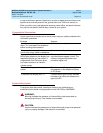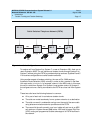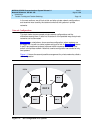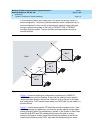
MERLIN LEGEND Communications System Release 6.1
Network Reference
555-661-150
Issue 1
August 1998
Introduction
Page 1-3Networking Concepts
1
Communications systems are linked by special facilities called
tandem trunks
.
These lines/trunks may be analog
tandem tie trunks
, T1-emulated tie trunks, or
tandem Primary Rate Interface (PRI) trunks.
As a group, they can be referred to
as
private network trunks
, because they enable private networks.
Private networks are distinct from the
public switched telephone network
(
PSTN
)
of facilities that link customers with central office (CO) service providers across
the nation and the world. PSTN lines and trunks allow you to communicate with
local and long-distance parties outside your organization.
Private communications networks are not simply communications systems
chained together by tandem trunks. They also allow
tandem
switching
, which
permits a communications system to route a call from outside a local system to an
outside
facility on a non-local system. In addition, a MERLIN LEGEND
Communications System can route calls from a tandem trunk to a local extension.
NOTE:
In this guide,
switch
is often used to mean
communications system.
For the
purposes of this guide, a
private network
denotes a network with tandem
trunks and tandem switching.
In a private network, correct operation requires that planning be coordinated for all
systems. If a private network includes only two systems, this may simply mean
that the system managers get together to assure that the correct programming is
performed initially, that each manager has a copy of the system forms for the
other system, and that the system managers discuss and agree upon any
subsequent modifications. In a larger private network, a
coordinating system
manager
should be appointed. This person should keep copies of all system
forms for all systems in the private network. When a change must be made at a
local system, it should be cleared through the coordinating system manager, who
assesses the change as it affects the private network as a whole. If a change in
one system requires modifications in other networked systems, the coordinating
system manager ensures that these changes are made.
If these terms and concepts are new to you, do not be alarmed. There is no need
to comprehend them immediately. You will gain a better understanding as you
learn the practical applications of these concepts.


















